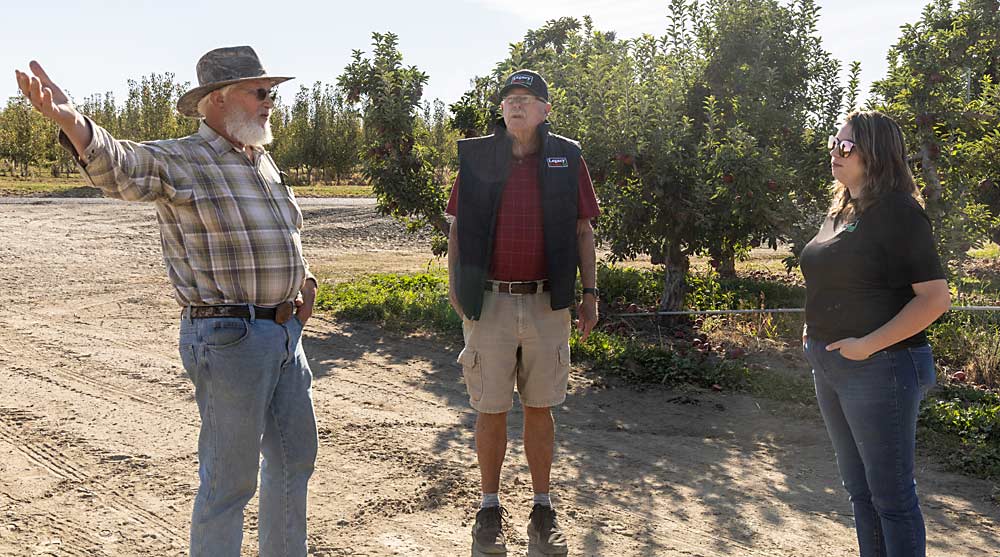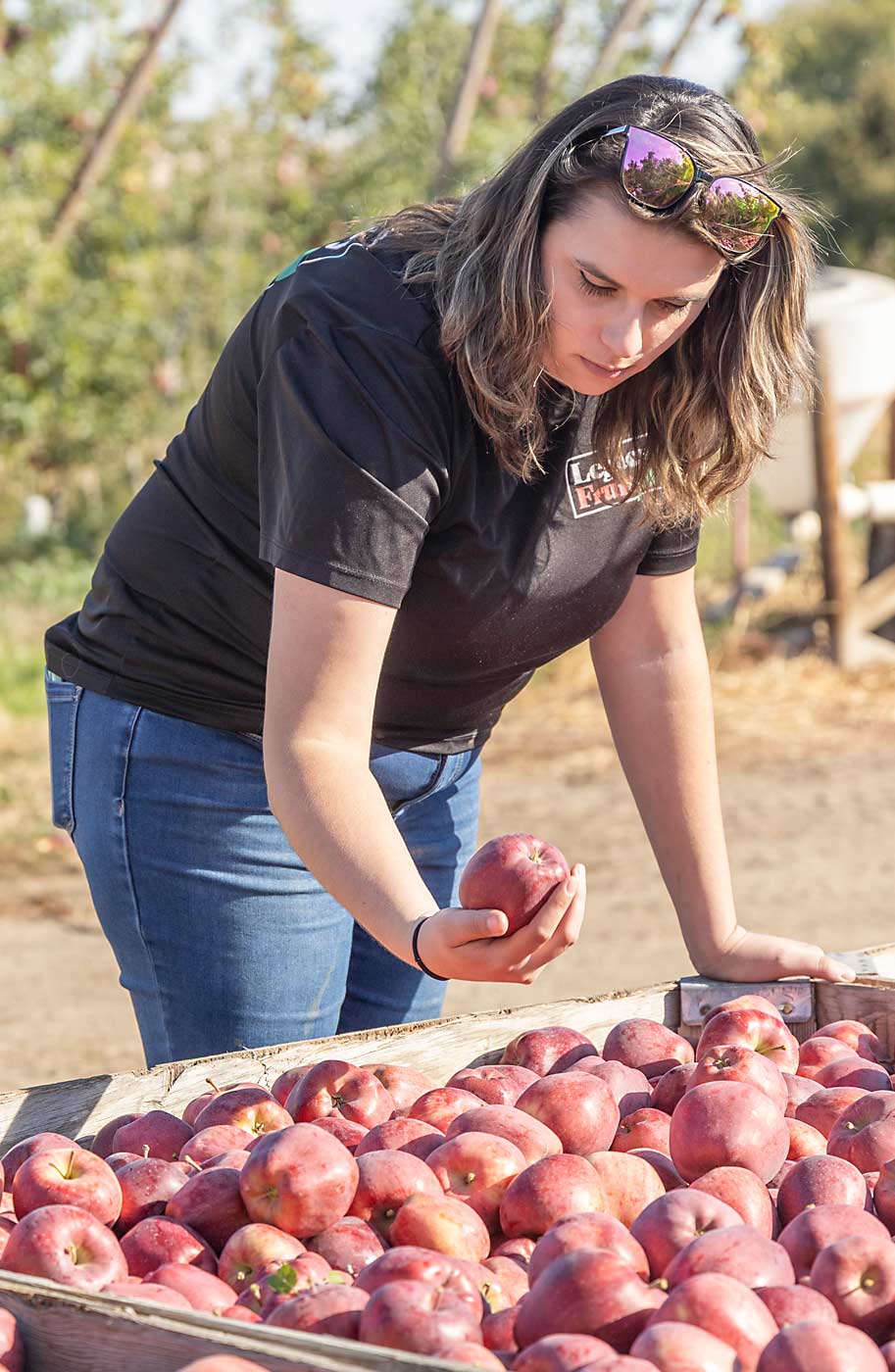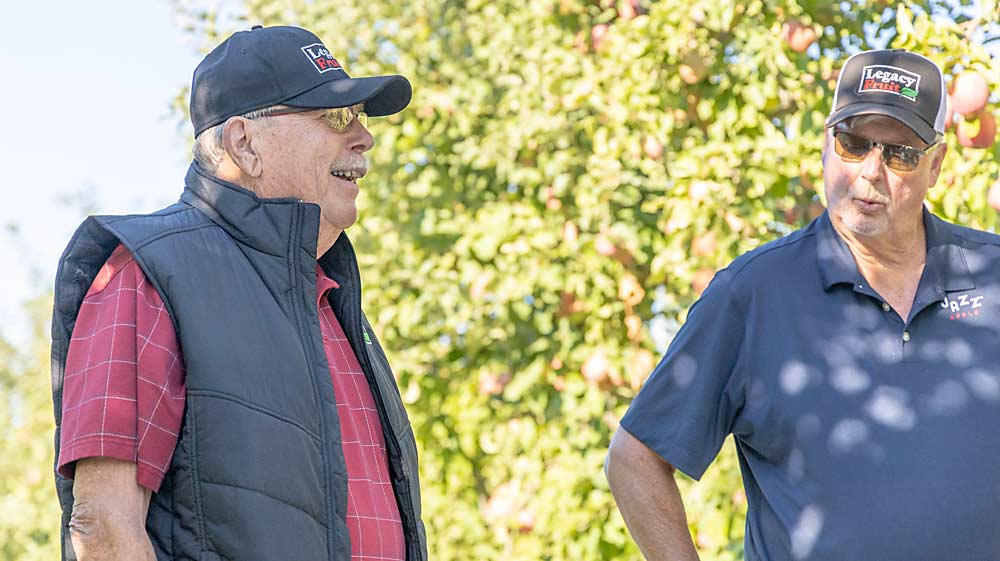
For small growers, the relationship with their fieldman can be more than just a connection to the warehouse. It’s someone to bounce ideas off of — which is a big need when you’re running an operation by yourself.
“You have to take care of your growers, that’s for sure,” said Legacy Fruit fieldman Harvey Noe. “I pop in every day during Honeycrisp harvest, even if it’s just 20 minutes.”
For years, Noe has been that supportive listener and the source of wisdom on fruit quality and harvest timing for many of Legacy Fruit’s growers in Washington’s Yakima Valley. So, when he decided it was time to retire, at 80, he wanted to make sure his growers could build the same relationship with their new fieldman, 25-year-old Cami Brandt.
“I finally felt the time was right. So, I talked to our supervisor and said I can walk away after harvest, or we can spend the year transitioning in with Cami,” Noe said. “Nothing else crossed my mind. I thought it was a perfect fit for her.”
Though they come from different generations, Brandt and Noe share the same philosophy: Success is built on strong relationships.
“I work with a lot of people but not a lot of tonnage. It’s a lot of families, and that’s my favorite part of the job, that it’s a personal thing,” said Brandt, who already worked with Legacy growers in the Lower Yakima Valley.

Last harvest, Brandt and Noe worked together to visit Noe’s growers, so Brandt could get to know them and their fruit, which includes more Honeycrisp and organics than her existing portfolio. In the lower valley, she is used to working with an earlier pool of fruit, while Noe’s growers in the cooler upper valley target the long-term storage season.
That’s where Noe’s experience, including from his decades as a warehouse quality control supervisor, shined. During his long career in the fruit industry, so long that he remembers the switch form boxes to bins, Noe worked at Highland Fruit Growers for 25 years and later at Larson Fruit of Selah, which combined with Valley Fruit of Wapato to form Legacy Fruit in 2015.
“I’ve done a lot of different things,” he said. He left the full-time warehouse job a decade ago, at 70 — “when I wanted to slow down a bit” — and stepped into the fieldman role, which he had done for Highland back in the 1980s.
“I’ve always enjoyed working with growers,” he said.
Noe’s experience and warehouse-side insight proved especially valuable last season, as growers grappled with mixed maturity on their trees after the April cold snap delayed bloom and pollination.
“I’ve never seen anything like this,” said grower Mike Van Horn, when Noe and Brandt visited his organic Fuji orchard in October to discuss what to pick in the first pass, and when. Some trees were loaded, others almost bare.
“There’s two maturities, since we got two blooms,” Noe said, which created two very different lots of fruit. He recommended coaching pickers to take their time while color picking.

“He’s taken good care of me,” Van Horn said. “Harvey’s got a lot of knowledge on maturity and storage, and he shares his knowledge from sales meetings, which helps me stay in business.”
Noe and Brandt continued to troubleshoot the unusual growing conditions at their next grower visit, meeting with Dan Green of Zillah in a block of Red Delicious that hadn’t developed its usual color or hit yield targets.
“I’m down on both Reds and Goldens,” Green said. “And the Grannies just didn’t have the flowers, they just didn’t come back after the heat. Then boom, another month of winter.”
The low yields meant a less efficient harvest, and Green was having trouble hiring and keeping enough pickers to get his fruit off the trees. So, Brandt reached out to another local orchard manager she knew, who was finishing up harvest that week, and asked him to pass along the message to workers that Green was still hiring.
That’s not exactly in the fieldman job description, Brandt said after the fact, but she’s successful when her growers are successful.
There are two types of growers, Noe said: those who are faithful to their warehouse for decades, and those who bounce around trying to find the best deal.
Count Green among the former: He’s been with Larson-turned-Legacy since 2000. He runs his 100-acre farm on his own, so the half-hour he spends checking in with Noe and Brandt, strategizing how to make the most of a challenging harvest, matters.
Despite their efforts to transition relationships, Brandt pointed out that there will be no replacing Noe’s experience or having the dedicated boots on the ground in the Upper Yakima Valley, while she will have to divide her time across a lot more territory.
“We’re definitely losing that mentor side in the orchard department,” Brandt said. But next season, he’ll still only be a call away, they joked. “I won’t let him just disappear,” she said.
—by Kate Prengaman






Leave A Comment